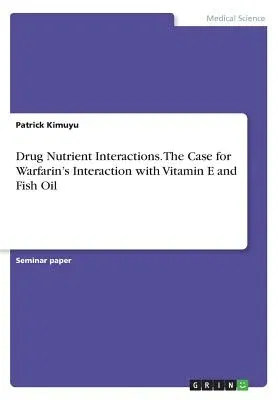Seminar paper from the year 2018 in the subject Medicine - Pharmacology,
grade: 1, Egerton University, language: English, abstract: This paper
will provide a comprehensive assessment of warfarin and its nutritional
interactions, primarily vitamin E and fish oil. In practice, nutritional
components are known to influence the efficacy of therapeutic agents.
Some nutrients improve the efficacy of some drugs, whereas others reduce
their therapeutic potency. As such, it is critical to understand the
nutritional interactions between drugs and the nutritional components in
the diet. Diets which interfere with the activity of certain drugs
should be avoided during the treatment period. This prevents nutritional
interactions which may result into adverse reactions. The same
precaution applies to nutritional supplements. Over the past few
decades, nutritional supplements have flooded the market. However, these
supplements raise safety concerns, especially on dosage, efficacy and
side effects. Despite the safety concerns, it is worth noting that some
nutritional components such as vitamins and fatty acids have been found
to have clinical significance. They are used for the treatment of
different health conditions and illnesses, especially when combined with
therapeutic agents. For instance, vitamin E and Omega-3 fatty acids have
gained immense acceptance in clinical practice. However, their use
should be guided by their interactions with drugs. Warfarin, an
antithrombotic agent, is one of the drugs which exhibit interactions
with vitamin E and fish oil. This drug is used for the prevention and
treatment of arterial and venous thrombotic disease since its
development. However, dietary interactions have always complicated its
safe use.


